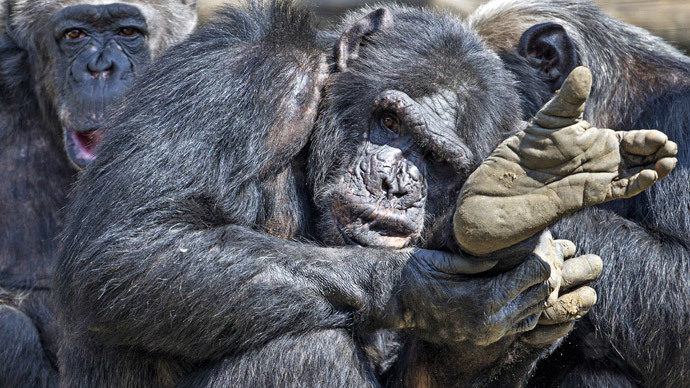Apes are people too? NY judge grants human rights to chimpanzees

Chimpanzee and human DNA differ by only about 1 percent – but should chimps be given human rights? A US judge said "yes" on Monday, ruling that apes held at a New York university are covered by the same laws that let humans challenge their detention.
New York Supreme Court Justice Barbara Jaffe said a pair of chimpanzees held at Stony Brook University are covered by a writ of habeas corpus – a legal principle that lets people challenge the credibility of their detention. The duo, named Hercules and Leo, reside at the university for research purposes.
The lawsuit against the university was originally filed by the Nonhuman Rights Project in December 2013, in an attempt to free Hercules, Leo, and two other chimpanzees living on private property.
The courts threw out the suit, but the group has been appealing ever since, receiving a victory on Monday after convincing Jaffe that the apes are sufficiently intelligent enough to be covered under habeas corpus.
The verdict has allowed for a Stony Brook University representative to be ordered to appear in court to provide a legally acceptable reason for detaining Hercules and Leo. That hearing has been scheduled for May 6.
During the hearing, the university will respond to a petition by the animal rights group which argues that Hercules and Leo should be set free and moved to a sanctuary.
“The NhRP (Nonhuman Rights Project) has asked that Hercules and Leo be freed and released into the care of Save the Chimps, a sanctuary in Ft. Pierce, Florida. There they will spend the rest of their lives primarily on one of 13 artificial islands on a large lake in Ft. Pierce, along with 250 other chimpanzees in an environment as close to that of their natural home in Africa as can be found in North America,” the Nonhuman Rights Project wrote on its website.
READ MORE: Argentine court extends human right to freedom to orangutan
However, it remains unclear whether the chimps will actually be freed.
Richard Cupp, a law professor at Pepperdine University, cautioned against reading too much into the ruling.
“The judge may merely want more information to make a decision on the legal personhood claim, and may have ordered a hearing simply as a vehicle for hearing out both parties in more depth,” he wrote in an email to Science. “It would be quite surprising if the judge intended to make a momentous substantive finding that chimpanzees are legal persons if the judge has not yet heard the other side’s arguments.”
Regardless of whether the apes are granted personhood after the hearing, the group says it plans on using the ruling as precedent in future cases.
“This is a big step forward to getting what we are ultimately seeking: the right to bodily liberty for chimpanzees and other cognitively complex animals,” Natalie Prosin, executive director of the Nonhuman Rights Project, told the American Association for the Advancement of Science (AAAS).
“We got our foot in the door. And no matter what happens, that door can never be completely shut again.”
A similar ruling was made in Argentina last year, with orangutans being granted the status of “non-human persons” with legal rights.
However, the verdict contradicts a separate New York ruling made just four months ago, when a court stated that a chimpanzee is not legally a person and therefore not entitled to human rights.












